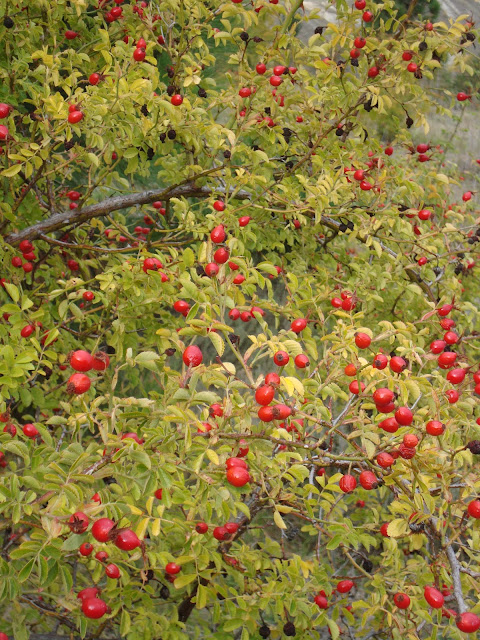The Rosehip
plants flowered in November. "Sweet Brier" is another import plant that
finds the distinct climate of our area very suitable and now is spread
across the region. That time of year it's a beautiful rose. All of the
time it's a pest with sharp catching thorns, making it difficult to get
past.
 |
| 21st November 2010 |
Later in the season we get berries and they look good too. And had an interesting use historically and not so long ago.
The
early gold miners came into this landscape where there were no trees,
only grasses and tussock. They ate badly and often only 'damper' which
is a flour and water 'bread' Vitamin C deficiency and the resulting
scurvy illness was a problem. Sweet briar berries are an excellent
source of Vitamin C so the brier was planted around camps and
homesteads. It likes our poor soils which limits competing growth.
It's berries have been taken by rabbits and birds and it's spread into
the wild was rapid.
Our climate here is a 'rainshadow' and it's interesting to see Rosehips spread in Patagonia
as well. The link to the very interesting 'Federal Twist' blog shows a
similar landscape where the rosehips, a european plant, have also
spread across the landscape.
(to see an explanation of 'rainshadow' click here)
Now it's March and the berries are out.
April will be when the berries are best to be
gathered. After the first frost. Remember this is the Southern
Hemisphere. Our winter is June, July August.
Before and after the second world war there used to be an industry where people could gather the berries wild, and be paid for them by a company (Robinsons) that made them into syrup. This was well regarded and issued to children as part of Government support programmes and purchased by parents for children and babies.
There is this interesting link with a lot of detail. http://curiouskai.blogspot.com/2010/05/rose-hips.html ('kai' is a New Zealand word for 'food')
end
(to see an explanation of 'rainshadow' click here)
Now it's March and the berries are out.
 |
| March 2012 |
 |
| March 2012 |
 |
| March 2012 |
Before and after the second world war there used to be an industry where people could gather the berries wild, and be paid for them by a company (Robinsons) that made them into syrup. This was well regarded and issued to children as part of Government support programmes and purchased by parents for children and babies.
There is this interesting link with a lot of detail. http://curiouskai.blogspot.com/2010/05/rose-hips.html ('kai' is a New Zealand word for 'food')
end


Interesting. Is there still a commercial market for the berries?
ReplyDeleteHere in Namibia we also have problems with imported species which are aggressive growers in our climate.
Those rose hips are beautiful. And they look tasty.
ReplyDeleteWild roses don't grow here, ours have to be in ICU watered thru the summer.
ReplyDeleteI think Robinson's stopped paying us to collect rose hips in 1968. That was the last time my friends and I took our sugar-bags to the local 4 Square store for collection in Omarama. Can anyone tell me the amount they used to pay us? I know it used to be quite substantial.
ReplyDeleteI used to collect and sell roe hips as a child. The last time I sold these was in 1968 which I believe was the last time Robinsons stopped their collections. We used to have our sugar-bags full of berries collected from the local 4Square store in Omarama. I remember that we got paid quite a substantial amount with cheques arriving in the mail.
ReplyDelete